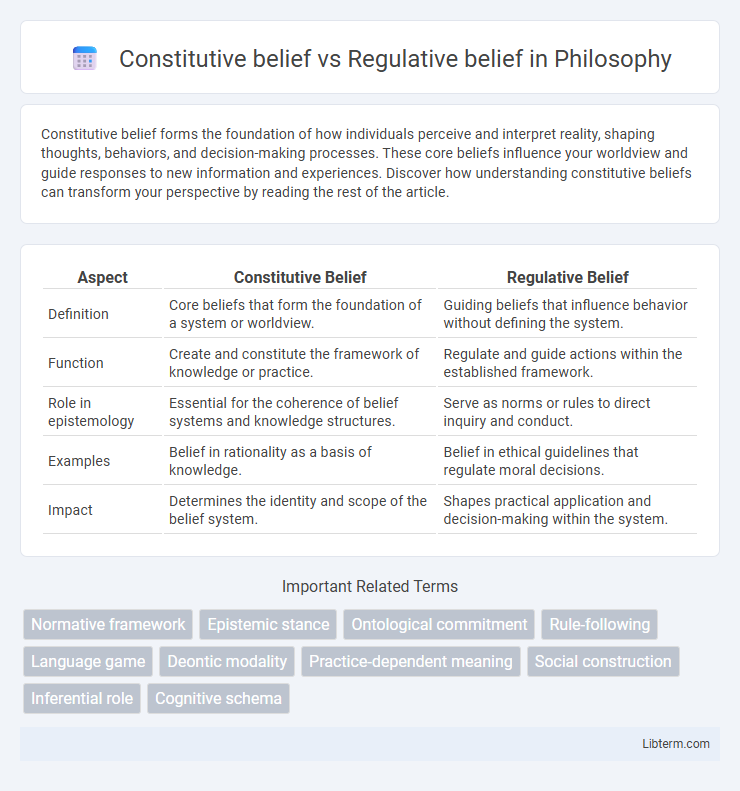Constitutive belief forms the foundation of how individuals perceive and interpret reality, shaping thoughts, behaviors, and decision-making processes. These core beliefs influence your worldview and guide responses to new information and experiences. Discover how understanding constitutive beliefs can transform your perspective by reading the rest of the article.
Table of Comparison
| Aspect | Constitutive Belief | Regulative Belief |
|---|---|---|
| Definition | Core beliefs that form the foundation of a system or worldview. | Guiding beliefs that influence behavior without defining the system. |
| Function | Create and constitute the framework of knowledge or practice. | Regulate and guide actions within the established framework. |
| Role in epistemology | Essential for the coherence of belief systems and knowledge structures. | Serve as norms or rules to direct inquiry and conduct. |
| Examples | Belief in rationality as a basis of knowledge. | Belief in ethical guidelines that regulate moral decisions. |
| Impact | Determines the identity and scope of the belief system. | Shapes practical application and decision-making within the system. |
Defining Constitutive and Regulative Beliefs
Constitutive beliefs form the foundational framework that defines the identity and core values of an individual or group, shaping perceptions and guiding long-term interpretive processes. Regulative beliefs, in contrast, govern specific behaviors and actions by establishing norms and expectations that influence decision-making in particular situations. Understanding the distinction clarifies how constitutive beliefs create meaning, while regulative beliefs direct practical conduct within cultural and social contexts.
The Origins of Constitutive Beliefs
Constitutive beliefs originate from foundational cultural and social norms that shape an individual's perception of reality and identity, acting as core frameworks for interpreting experiences. These beliefs are embedded deeply in early socialization processes and institutional structures, differentiating them from regulative beliefs that guide specific behaviors or practices. Understanding the origins of constitutive beliefs involves examining historical, cultural, and psychological factors that establish the underlying principles governing thought and social interaction.
The Role of Regulative Beliefs in Society
Regulative beliefs function as guidelines that shape individual behavior and social norms within communities, promoting order and predictability. These beliefs influence actions by setting standards for right and wrong, often underpinning legal systems and moral codes. Their role in society is crucial for maintaining cohesion and ensuring cooperative interactions among members.
Philosophical Foundations of Belief Systems
Constitutive beliefs form the foundational fabric of a belief system, defining the very nature and identity of the worldview itself, while regulative beliefs guide behavior and responses within that framework. In the philosophical foundations of belief systems, constitutive beliefs establish ontological and epistemological premises, whereas regulative beliefs function as normative principles shaping ethical and practical conduct. Understanding the distinction clarifies how belief systems maintain coherence and adaptability, anchoring core truths while directing lived experiences.
Constitutive Beliefs and Identity Formation
Constitutive beliefs serve as foundational principles that shape an individual's core identity by defining how they interpret experiences and construct self-concept, playing a critical role in identity formation. These beliefs function as cognitive frameworks that establish the criteria for what is meaningful and truthful within a person's worldview, influencing decision-making and behavior consistency. Unlike regulative beliefs, which guide actions toward goals, constitutive beliefs fundamentally shape the understanding of self and the social roles one adopts.
Regulative Beliefs and Ethical Guidelines
Regulative beliefs guide behavior by prescribing how individuals ought to act, shaping ethical decision-making and actions within social and professional contexts. These beliefs form the foundation of ethical guidelines, providing norms and standards that regulate conduct to ensure fairness, honesty, and accountability. Emphasizing regulative beliefs enhances organizational integrity and promotes consistent adherence to moral principles in practice.
Key Differences Between Constitutive and Regulative Beliefs
Constitutive beliefs define the nature and identity of a practice by establishing the rules and norms that inherently shape its structure, whereas regulative beliefs guide behavior by prescribing how individuals should act within or upon a practice. Key differences include the fact that constitutive beliefs form the underlying framework essential for a practice's existence, while regulative beliefs function as external guidelines influencing actions without altering the core practice itself. This distinction highlights the foundational role of constitutive beliefs in maintaining practices versus the adaptive role of regulative beliefs in directing participant behavior.
Interplay and Overlap Between Belief Types
Constitutive beliefs shape the framework of reality and define what is considered possible within a cultural or individual context, while regulative beliefs guide behavior and decision-making by prescribing norms and rules. The interplay between these belief types occurs as regulative beliefs often rely on constitutive beliefs to establish their validity, creating a feedback loop where changes in one can influence the other. Overlap appears when certain beliefs simultaneously define both the boundaries of thought and behavioral expectations, highlighting their interconnected roles in shaping cognition and social conduct.
Impact of Belief Structures on Decision-Making
Constitutive beliefs form the core framework that shapes individuals' perception of reality, directly influencing how information is processed and decisions are formulated. Regulative beliefs guide the evaluation and regulation of behaviors by providing standards and norms that affect decision-making strategies. The interaction between constitutive and regulative belief structures determines the consistency and adaptability of decisions in complex environments.
Practical Implications for Belief Analysis
Constitutive beliefs form the framework that shapes an individual's perception of reality, directly influencing how new information is interpreted and integrated. Regulative beliefs guide behavior and decision-making by setting norms and standards for action within specific contexts. Analyzing these belief types reveals critical insights into cognitive consistency, motivation, and the dynamics of belief change in practical psychology and behavioral studies.
Constitutive belief Infographic

 libterm.com
libterm.com